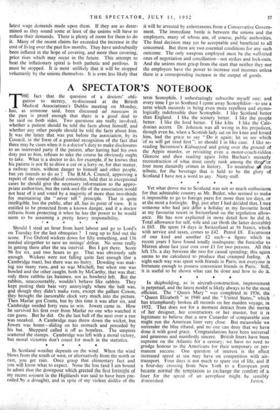A SPECTATOR'S NOTEBOOK
THE fact that the question of a doctors' obli- gation to secrecy, re-discussed at the British Medical Associations's Dublin meeting on Monday, has, as someone said, been discussed ad nauseam in the past is proof enough that there is a good deal to be said on both sides. Two questions are really involved, whether a patient should be told the facts about himself, and whether any other people should be told the facts about him. It was the latter that was put before the association, by its Council, in the form of a guarded recognition of the fact that there may be cases when it is a doctor's duty to make disclosures to an interested party if the patient, after having had his own duty put to him, refuses to take the course he obviously ought to take. What is a doctor to do, for example, if he knows that his patient is not fit to drive a car or a lorry or, for that matter, a railway train, without danger to himself and other people, but yet intends to do so ? The B.M.A. Council, approving a report Of the central ethical committee, held that in exceptional cases he should give the necessary information to the appro- priate authorities, but the rank-and-file of the association would not hear of it and voted by a majority of more than two-thirds for maintaining the " never tell " principle. That is quite intelligible, but the public, after all, has its point of view. It is entitled to be protected from a known danger, and if a doctor refrains from protecting it when he has the power to he would seem to be assuming a pretty heavy responsibility. r * - * * *







































 Previous page
Previous page